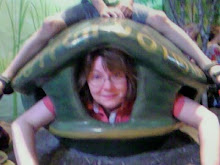 As we sat and waited for the next child, the assembled group of adoption agency, orphanage and government representatives lost all pretense of social conversation. Every comment and nicety had been exchanged. We sat.
As we sat and waited for the next child, the assembled group of adoption agency, orphanage and government representatives lost all pretense of social conversation. Every comment and nicety had been exchanged. We sat.Eventually the side door opened and the caregiver ushered in a little boy who appeared to be two or three. He was small with a pointed face and darting dark eyes. He walked toward us with a measured step, hesitant but still propelled forward.
His name was Artu. I recognized his brightly-colored shoes immediately; they were the ones that Anya had been wearing. The shirt, too. In a sudden, troubling clarity I realized why fetching the next child had taken so long. The orphanage must have a small number of clothes that they considered acceptable for visiting with prospective parents. The caregiver was removing the outfit from poor, quaking Anya and putting it on Artu. How were the children normally kept when not in costume? What was it like behind that door? I never found out.
The director announced that Artu was almost three and had been in the orphanage since birth. She added that he was racially mixed. In Kazakhstan, that means Russian/Russian Orthodox and Kazakh/Moslem. I asked, "Is that a problem here?" There was a profound silence.
Trying both to clarify and to dig myself out of potentially offending my hosts, I added, "In this society, will it be a hardship for him?"
Trying both to clarify and to dig myself out of potentially offending my hosts, I added, "In this society, will it be a hardship for him?"
The interpreter grudgingly translated. Multiple responses came.
"No, of course not. In our society, everyone is equal and has the same opportunities. We are a very fair country. Not like some other places."
I don't know if she meant the US as one of those "other places" where racial and ethnic discrimination were rampant, but that might have been a fair call, stinging though it did. I tried one more time.
"We have some problems in the United States but we are more diverse where we live than in Uralsk. If he would have a very difficult life in Kazakhstan and a much easier life in the US, that's what we want to know because that would be a factor in our decision."
The director again assured us that there were few problems in their egalitarian society. In later days after we had built more rapport, I asked Inna the translator about that. She said that mixed race children were very rare and had difficulty being accepted by either group. After we returned home to the US, we learned from other parents that the children were grouped in the orphanage into rooms by race. During the Soviet years, the Russians had the upper hand and flourished in higher-level jobs while pushing the Kazakhs out. After the Kazakhs became independent, they instituted rules that promoted ethnic Kazakhs and made it difficult for ethnic Russians to hold higher offices. The formerly oppressed oppressing the oppressors. Yes, that's bound to end well. People don't seem to learn from history.
We played with Artu for a while though I remember little about him. He was a sweet little boy and I hope someone adopted him. For us, he didn't have any spark and we didn't feel a connection.
After Artu was led out in his little brightly-colored shoes that would undoubtedly make an appearance for the next visitor, the director told us that these were all the children that were currently available and that she would be awaiting our decision.
Within minutes, we were out in the muddy courtyard. Dima was waiting in his car to drive us to who knows where. The agency reps like velvet pliers applied the message: You can have all the time you want to think but every day is a delay.
There was little point in making the long drive back to the apartment to have a discussion and we really didn't want to talk in front of strangers. We asked our companions from the agency to give us some time and some privacy. We walked to the far end of the yard to a spot near the road. I remember there were some kind of raised pipes that made borders on either side of us as we walked back and forth.
A lot of people spit in public in Kazakhstan. Even beautifully dressed women spit on the sidewalk. Between the mud and the spitting, it's not surprising that most people wore tall boots. Our adoption reps leaned against the car, chitchatted, and occasionally spit on the ground while they waited patiently.
Nurlan? Anastasiya? Irat? Anya? Artu? Push the agency to shake the directors to see more children? There were lots of children in those buildings. We could hear them. But the rules of this game aren't clear. The directors didn't seem open to more than they had already done. We don't have much leverage.
You can't save the world even if you want to. Pull it back into focus. Which children seemed like they "fit" with us?
We walked back to the car, watching where we stepped.
"Would you like to go back to the apartment or maybe to see one of the children again?," Inna asked.
"No. We have a decision. Please get us the paperwork."
Inna spit.




No comments:
Post a Comment